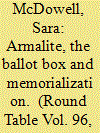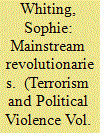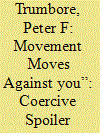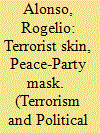|
|
|
Sort Order |
|
|
|
Items / Page
|
|
|
|
|
|
|
| Srl | Item |
| 1 |
ID:
080578


|
|
|
|
|
| Publication |
2007.
|
| Summary/Abstract |
Commemoration of the Northern Ireland Troubles has gained increasing currency since the inception of the first paramilitary ceasefires in 1994. Imagined initially as a mechanism through which to express grief and acknowledge loss, remembering the past has an increasingly social and political value. Inscribing narratives of the past into the streetscape is inexorably linked to the present as some of the main actors of the conflict vie for power and territory. A political resource, memorializtion has been employed as a tool to alter the parameters of the Troubles. This paper focuses on the changing fortunes of Sinn Féin (the political wing of the paramilitary organiztion the Irish Republican Army), and the British government in peacetime Northern Ireland, through an examination of the commemoration of their respective dead
|
|
|
|
|
|
|
|
|
|
|
|
|
|
|
|
| 2 |
ID:
148915


|
|
|
|
|
| Summary/Abstract |
Despite the seismic shift of Sinn Féin from being the “mouthpiece” of the Provisional Irish Republican Army to the largest nationalist force in Northern Ireland, the party continues to project its objectives within the revolutionary politics and tradition of 1916. Whilst various groups across the island of Ireland stress their loyalty to Irish independence and allegiance to their republican forefathers, 2016 also plays host to devolved assembly elections in Northern Ireland. The centenary of the Easter Rising is therefore a poignant moment to reassess republican politics, more specifically, the relationship between the armed revolutionary tradition and constitutionalism. Within the post-peace process era Sinn Féin have been accused of maintaining an autocratic culture and an intra-party framework that is more representative of a clandestine revolutionary organisation than a political party. Yet, simultaneously, Sinn Féin have not been immune to the pressures experienced by other modern political parties, bound by the laws of electoral competition and driven by office-seeking priorities. In order to explore Sinn Féin within the modern political arena, this article firstly examines the broader debate surrounding how armed groups make the transition into constitutional politics. Secondly, public opinion survey data is used to judge the basis of Sinn Féin's electoral appeal. Finally, internal party documents are used to examine party structure, intra-party democracy, and professionalisation in order to judge the extent to which Sinn Féin have completed the transition from being a “mouthpiece” to their armed counterpart, towards being a “normal” political party.
|
|
|
|
|
|
|
|
|
|
|
|
|
|
|
|
| 3 |
ID:
159904


|
|
|
|
|
| Summary/Abstract |
More than a decade on, the Northern Ireland peace process can largely be considered a success. Despite the failure of the Provisional Republican Movement to achieve a united Ireland free of British control, the large-scale violence of “The Troubles” has been relegated to the past. Applying the logic of coercive diplomacy, this study examines the role of threats and the use of selective and limited violence by the Provisional Movement to manage real and potential opponents and challengers that have emerged within its own ideological ranks to maintain its position of dominance and prevent a spoiling of the peace process. This study shows that the Provisional Movement retained the capability to employ violence and demonstrated the credibility of coercive threat through a willingness to use force against its opponents on the Republican spectrum, and was able to do so with a high degree of impunity.
|
|
|
|
|
|
|
|
|
|
|
|
|
|
|
|
| 4 |
ID:
192281


|
|
|
|
|
| Summary/Abstract |
The Ottoman Empire and Ireland seem an unlikely pair in every respect. In the secondary literature, the paths of the two countries never converge. Except for Sultan Abdülmecid’s famous aid during the Famine, there has been virtually no discussion of the relationship between the two countries. By using the accounts of Ottoman authors and through a careful reading of archival materials from different eras, this article analyses the Ottoman perceptions of Ireland from the early modern era to the twentieth century. These documents and testimonies suggest that there was considerable interest in Ireland among Ottoman intellectuals and statesmen. They saw the country as some sort of anomaly which could be possibly useful in their dealings with Britain. For that reason, they diligently followed the developments taking place in Ireland. The case study developed in this article demonstrates first the importance of Ottoman archival materials for the purposes of comparative history; second the vibrant interest of the Ottoman Empire in the outside world in general and in Ireland in particular.
|
|
|
|
|
|
|
|
|
|
|
|
|
|
|
|
| 5 |
ID:
148914


|
|
|
|
|
| Summary/Abstract |
The article analyses the political communication strategy adopted by Sinn Féin in order to legitimize the Provisional Irish Republican Army's (PIRA) terrorist campaign during their transition from violence into mainstream politics. Their endeavours to portray a triumphant republican movement in spite of the huge gap between strategic aims and achievements are examined. The political and social rehabilitation of violent Republicanism, and how their leaders have evolved from pariahs to celebrities, is also assessed. The role of the media and political elites, as well as the political discourse of the PIRA and Sinn Féin, is analysed in order to examine how the republican movement has tried to rewrite its past in an attempt to gain political and social legitimacy. Consequently, the myths reproduced by republicans to disguise their failures as historical compromises, reproducing a more benign interpretation of history which distorts the causes and consequences of terrorism, are critically assessed. The article will focus on the struggle for the legitimacy of the terrorist campaign and the propaganda system which, in the words of Garret FitzGerald (Irish Prime Minister between 1981 and 1987), has managed to turn the republican movement into the “peace party” despite murdering thousands of human beings.
|
|
|
|
|
|
|
|
|
|
|
|
|
|
|
|
|
|
|
|
|